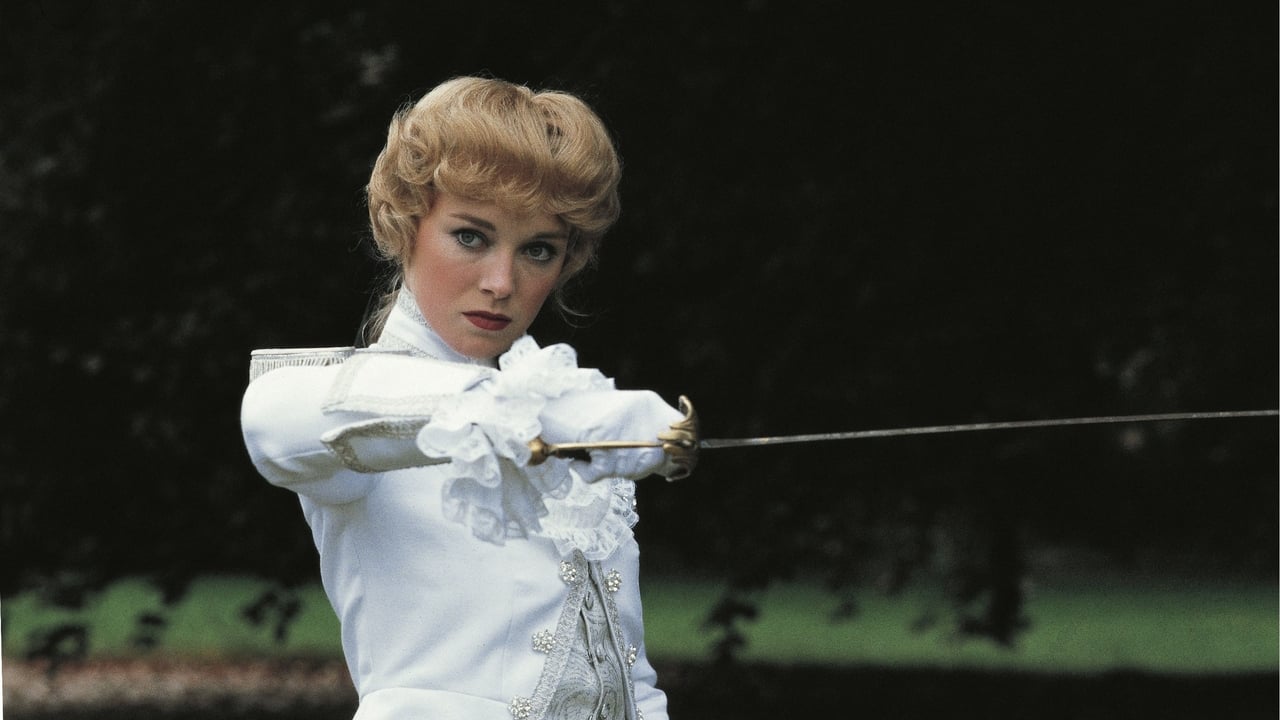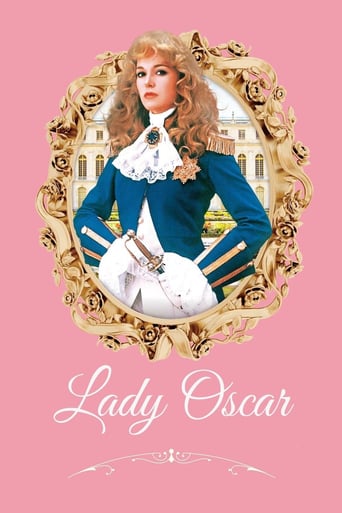

Jacques Demy's movie of Lady Oscar frequently moved me. It is not a "swashbuckler" in spirit, it does not glamourise violence; it is not a movie about "girl power". It is a tragedy that raises important questions about freedom and gender. After becoming father to a series of daughters whose mother dies in childbirth, Général de Jarjayes decides that his latest daughter will in fact be a son, Oscar, and brings her up to be an heir and defender of the de Jarjayes name. He is delighted to find her a position as bodyguard to Marie Antoinette. Oscar is unquestioning of the system into which she is inducted, a bubble of privilege, acid wit, and decadence. She is dutiful and she "knows her place". At the same time the young boy and later groom who was her companion when Oscar grew up seems to have much more class consciousness. What her gender transformation helps to do is to de-romanticise the material, when Oscar accepts a duel, the result, devoid of machismo, comes off as a banal murder, which is precisely what it is. It is difficult to wholeheartedly see Oscar as an éoniste or transgender hero as her identity as Oscar is created for her by her father. Indeed her self-actualisation is intertwined with her accepting a more female identity. On the other hand she does use her identity as Oscar to react against male society, and becomes a role model for some of the Versailles women.Oscar, despite adopting a male role, is not free. This is potentially quite an important point of the movie, equality and freedom are not the same thing. Her role is to hang around the wilful and indolent Antoinette, and she develops a strong sense that her life has become meaningless. To become a man is not to have meaning, it's an escape from a trap within a trap, the outer trap being the Ancien Régime in the case of this movie. When Oscar attempts to enter a regiment, her male soldiers refuse to obey her, and her superior officer gives her no support whatever. In any case the regiment only exists to suppress the people.At a very late stage Oscar finds freedom in an act of defiance. You can feel the weight lift off her shoulders as she spends her first day as a truly free adult, despite residing in a prison cell. This feels very contemporary, freedom is something very few of us are born with, it's something we have to seize, it's profoundly personal and cathartic.Another reviewer on this site refers to Barry Lyndon as inspiration, "Now the magic of that was its carefully spaced vacuums. It had engineered emptiness, something that only a master could do." That is definitely something Lady Oscar is attempting, in my belief it worked better than my fellow reviewer felt.A note on historical accuracy. Thomas Jefferson described Marie Antoinette as, "...proud, disdainful of restraint, indignant at all obstacles to her will, eager in the pursuit of pleasure, and firm enough to hold to her desires, or perish in their wreck." That is exactly how she is portrayed in Lady Oscar by Christine Böhm. Jefferson also describes the relationship between the King and the Queen thus, "he had a Queen of absolute sway over his weak mind and timid virtue..." Again this seems to have been very well captured in the movie.Lady Oscar is a politically complex movie which seems often to have been misjudged by relying on a fruitless comparative analysis with the animé and manga sources of the story. Whilst actually quite serious it does however have its gorgeous moments.
... View MoreTo correct some inaccuracies in the above review, the anime "Rose of Versailles" came before "Lady Oscar," not afterward, and it was not targeted towards children. "Lady Oscar" is primarily based on the manga "Rose of Versailles" by Riyoko Ikeda, although it contains several plot differences from either anime or manga. The so-called "historical clichés" and the feminism the above reviewer cites are part of Ikeda's story and have nothing to do with the director of "Lady Oscar." I found the movie slightly disappointing in its variations from the anime and manga, but overall I liked it. It was nice to see the story of Lady Oscar presented in English, and I enjoyed seeing European actors filling the roles. Oscar's character differs greatly from her personality in the anime, but I found her much more personable in "Lady Oscar." I was disappointed, however, in the portrayal of Marie Antoinette as she was wholly flaky and unlikeable in "Lady Oscar" and lacked all the redeeming qualities she possessed in the anime. Also, the film overlooks the close nature of her relationship with Oscar as portrayed in Ikeda's manga.
... View MoreI've finally had the chance to watch Jaques Demy's movie - Lady Oscar. I waited so long to see it and i put so much enthusiasm on it that i almost can't bear the disappointment. As a big fan of Ryoko Ikeda, of "Berusaiyu no bara" and of the Japanese musical version of it, i have to confess: the movie HURT! The acting is so bad, the story is so cut, no fluidity between scenes ... and the end ... oh, that is really painful!!! Oscar is too cute ... no! better said: "sweet"... but OK. Marie Antoinette too stupid! Fersen .. where is Fersen??? So little appearance that i forgot he existed. Girodelle .. oh! ... disgusting! And was that brown haired girl really Rosalie? I think it was the opposite of her. The only character i can't comment on it, is Andre. He was (especially on the first part of the movie) ... he was Andree. He was human, real and acted well .. Pity he ended so stupid ... Everything in this movie have no meaning ... and some scenes are just ridiculous.
... View MoreLost ,nobody will deny,is it a sleeper, a great forgotten work?I have my doubts."Lady Oscar",a Japanese production, was never commercially released in Demy's native France.It's a movie so hard to see I had to wait twenty-four years.Was it worth the wait?Partly,but only partly.It's hard to recognize Demy's touch is these historical adventures.The action takes place in the years before the French revolution and I really wonder why Demy used English actors to play Marie-Antoinette,Madame de Polignac,Louis the Sixteenth et al.The historical facts do not rise above the historical clichés:the hamlet of the Queen,the necklace case,her affair with Axel Fersen.Sacha Guitry did much better with his "si Versailles m'était conté";humor is definitely lacking here.The characters of fiction are essentially walk ons ,mainly in the first half.Then Lady Oscar begins to hit her stride,with feminist accents dear to Agnès Varda (Demy's wife and producer).But the end is disappointing as if Demy had planned a sequel(there was a Japanese cartoon,featuring the Lady Oscar -the woman raised and dressed as a boy-,some years after but targeted at the children's market).So what makes this movie worthwhile though?The dazzling costumes,Demy's refined style,all the wonderful ball scenes.The form is a feast for the eye and almost entirely overshadows the content.Lambert Wilson,who was to become a famous actor in the eighties and nineties has a cameo :he's the insolent soldier.That said,the great lost Demy movie is not "Lady Oscar" but his stunning "pied piper" (1972)
... View More